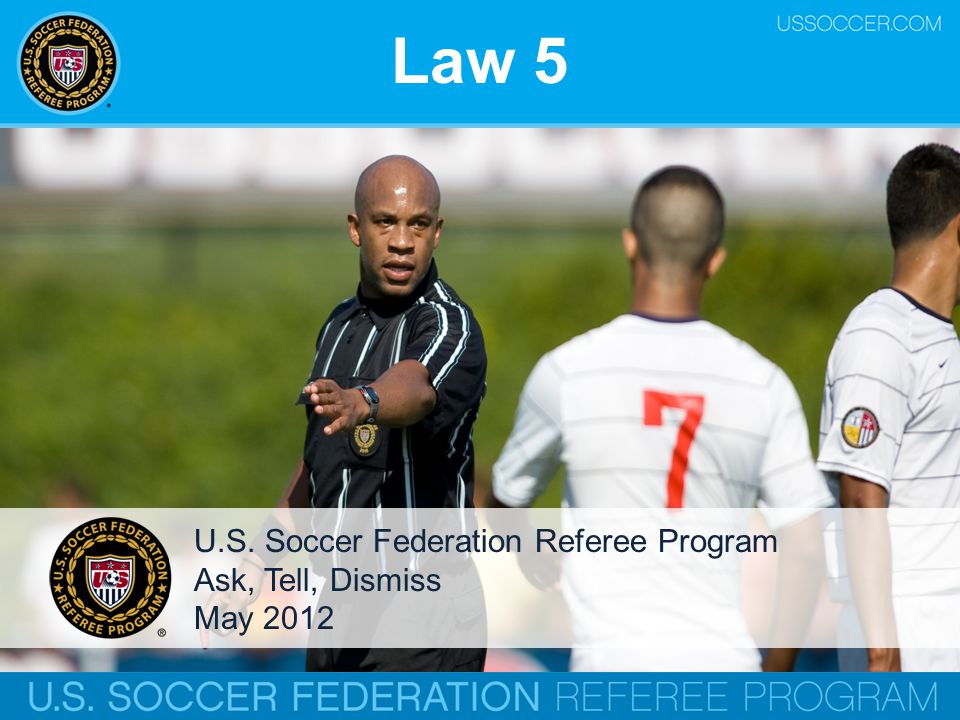U.S. Soccer Federation Referee Program - Advice to Referees
U.S. Soccer’s Advice to Referees is meant to provide officials of all levels with guidance on the interpretation and application of the Laws of the Game and to create consistent guidelines and procedures for officials to follow in all affiliated competitions.

Ask, Tell, Dismiss
Sometimes during a game, not all the critical activities occur on the field. The bench areas, or technical areas if they exist, can be the scene of irresponsible behavior that impacts what is happening on the field. In these cases, U.S. Soccer recommends that referees use the Ask, Tell, Dismiss approach when dealing with coaches or other team officials. Coaches cannot commit fouls or misconduct but they can engage in irresponsible behavior which endangers or undermines the referee’s ability to manage the game. Most of the time, coaches behave appropriately, even in the face of their obvious passion and excitement about how their team is performing. However, when those actions become unacceptable, referees must be prepared to take the following actions:
- First, when irresponsible behavior arises, the referee should ASK the person to modify his or her behavior.
- Second, if the behavior does not return to an acceptable level, the referee should inform the person that their actions will not be tolerated and TELL him or her to stop.
- Third, if the unacceptable conduct continues, the referee should take the final step in the process and DISMISS the person from the field of play and its immediate surroundings (out of sight and sound).
In games using assistant referees and fourth officials, the
Ask, Tell, Dismiss process requires coordination among all match officials. Only the referee has the authority to dismiss a team official and some referees want to be involved throughout the process while others rely almost exclusively on the bench-side assistant referee or fourth official to handle the initial steps.
Ask, Tell, Dismiss supports the powers and duties outlined in Law 5 that require the referee to take action against team officials who fail to conduct themselves in a responsible manner. Note, the term 'team official' refers not only to coaches but to other non-playing personnel on the bench or in the technical area. The irresponsibility of a coach’s behavior has to be measured in terms of the extent to which it improperly interferes with the game on the field or with your ability to manage the game within the Law. The referee has the flexibility to decide what constitutes irresponsible behavior by team officials, some examples may include the use of offensive or insulting language or gestures, persistent questioning of decisions, kicking or throwing items, or refusing to remain near the bench or within the technical area.
Ask, Tell, Dismiss is intended to provide referees with a practical and flexible approach to resolve behavior issues with team officials. It is important to note that dismissing a coach or other team official does not require that each step of the process be followed. In cases where behavior is overly disruptive, blatant, or serious, the referee is always authorized to bypass any warning and immediately issue a dismissal. If the dismissed person is the only responsible adult connected with a youth team (under 16), then the match must be terminated.
Referees should never engage a spectator. Spectators are not mentioned anywhere in the Laws of the Game and, consequently, referees do not have any direct authority over them. Coaches are responsible for spectator behavior and any unacceptable fan conduct must be addressed by the coach. If necessary, referees can stop the game and ask the coach to deal with the poor spectator conduct. If the behavior is not corrected, that spectator needs to leave the vicinity of the field and if a coach is unable or unwilling to correct the situation, the match can be terminated.